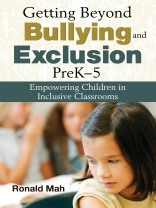‘This is the first text I′ve read that connected specific disabilities to bullying. The material is informative, relevant, and thought-provoking. A useful tool in understanding the evolution of a bully and the necessity of early, appropriate intervention.’
—Karen Thomes, Early Childhood Special Educator
Indian Island School, ME
Help students with special needs develop skills for meeting the challenges of bullying!
Children with challenges can encounter difficulties in navigating their journeys within mainstream classrooms. This book focuses on the vulnerabilities of youngsters to be bullied, especially those with learning disabilities, attention deficit hyperactive disorder, Asperger syndrome, and gifted abilities, and also discusses the tendencies for these children to become bullies.
Getting Beyond Bullying and Exclusion, Pre K–5 deepens teachers′ understanding of common challenges and provides an intimate and realistic view of how children with special needs can become easy targets for bullies. The book also shows how adults can inadvertently facilitate development of victim behavior in children or contribute to the development of bully personalities. With an abundance of tried-and-true techniques for helping children manage emotions and build on their strengths, this book examines:
- Bullying styles, including classic male and female models
- How teachers can prevent and stop bullying
- Methods for intervening early before a negative dynamic progresses into middle or high school
- Strategies for working with overprotective parents
- A ’90-Second-a-Day Self-Esteem Prescription Plan’ to improve children′s self-views
Ideal for both teachers and counselors, this book increases the sensitivity and expertise that educators need to help children with special needs become more resilient and experience success at school.
Tabela de Conteúdo
Acknowledgments
About the Author
Introduction
Inclusion Means…
Inclusion Means More
Inclusion Means Less
Educational Challenge
Exclusion…and Bullying
Compromising the Intent of Inclusion
Continuums or Labels
Three Perspectives
1. Inclusion, Exclusion, and Bullying
The Chicken Spends Its Whole Life…
The Hawk Spends Its Whole Life…
Anxious Vulnerability
Please Please Please…
The Loud Aggressive ‘Victim’ Becomes a Bully
Victim Entitlement to Bully and Intellectual Bullying
Classification Creates Targets for Exclusion
2. The Stress, Frustrate, Fail, Suffer Method and Emotional Intelligence
The Real World
The First S Is for Stress–Stress ′Em!
The First F Is for Frustration–Frustrate ′Em!
F Is for Failure–Let ′Em Fail! (Make Sure They Fail!)
The Second S Is for Suffer–Let ′Em Suffer
Emotional Intelligence
3. Create Powerful and Successful Children
Win So He Would Throw a Tantrum
The Next SS Is for Sensitivity and Support
The Next SS Is for Skills and Strength
SF Is for Survive and Flourish
4. Social Cues
Who Is This Kid?
Reasons Individuals Don′t Get it!
5. Reasons for Missing Social Cues
Physical Disability–Compensation (No.2 of 11): ‘What? Huh?’
Cross-Culture Issues–Cross-Culture Education (No. 3 of 11): ‘So that′s what you mean!’
Overstimulation–De-Stress (No. 4 of 11): ‘I′m tired. I don′ wanna have fun!’
Denial–Alleviate Fear (no. 5 of 11): ‘Nah, nah, nah!’
Anxiety–Stabilize and Secure (No. 6 of 11): ‘What? Where? Watch out? Where? Now? Oh no!’
Neurosis–Reality Filter or Check (No. 7 of 11): ‘That was then, and this is then.’
Dissassociation–Trauma Work (No. 8 of 11): ‘Click…This station is no longer broadcasting…or receiving.’
Learning Dissabilities–Compensation (No. 9 of 11): ‘Trying hard, harder, and harder…’
Attention Deficit Hyperactivity Disorder (and Attention Deficit Disorder)–Focus (No. 10 of 11): ‘Attention wanders…’
Intoxication and Substance Abuse–Sobriety (No. 11 of 11): ‘Common adverse effects…’
6. The Victim Dynamic
Why Do You Pick Up Crying Babies?
Victimized by Victims
Reversing the Dual Theory of Frailty
How Victims Are Created
7. Creating Bullies
A Blustering, Browbeating Person
Bullies, Aggression, and the Search for Self-Esteem
‘Who Are you Looking At!?’
‘Huh? What?’
8. Relational Aggression
‘You Can′t Come to My Birthday Party’
What Do You Mean…’We?’
9. Frustration to Resentment to Aggresstion
Lost Self-Esteem
Bullies With Learning Disabilities
Bullies With ADHD
10. Arrogance and Entitlement
Bullies With Asperger Syndrome
Bullies With Gifted Abilities
11. Motivation and Survival
Adult Stress, Frustration, Failure (and Suffering)
‘Or Else What?’
Internalized Motivation
Cultural Characteristics of Children With Challenges
Conclusion
The Ninety-Second-a-Day Self-Esteem Prescription Plan
A Last Thought
References
Index
Sobre o autor
Ronald Mah, an educator and licensed marriage and family therapist, has worked in early childhood education for 16 years. A credentialed elementary and secondary teacher, he is the author of Difficult Behavior in Early Childhood and The One-Minute Temper Tantrum Solution (2006 and 2008, Corwin Press). He wrote the Asian Pacific Islander Parent Education Support curriculum (DHS-San Francisco, 1996). Mah has DVDs on child development and behavior (Fixed Earth Films), and has been involved in community and high school mental health clinics, severe emotional disturbance, at-risk youth, welfare-to-work, and Head Start programs. A graduate college instructor and Board of Directors member of the California Association of Marriage and Family Therapists and of the California Kindergarten Association, Mah combines concepts, principles, and philosophy with practical techniques and guidelines for effective and productive results. Mah has a psychotherapy practice in San Leandro, California where he works with children, teens, adults, couples, and families.











